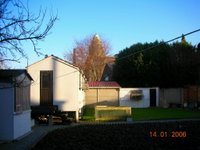Le Pigeon Voyageur


Sunday, Herman and I went to visit Uncle Gerard and Tante Marie Louise in Zottegem. Uncle Gerard is a passionate pigeon breeder and racer. He loves his birds and now, nearly 80 years old, he takes care of them every day. For a long time pigeons have been parts of my life between Uncle Gerard and Reuters.
It all started long time ago when Noah sent out three doves after the flood; one of them returned with an olive branch, a sign of reconciliation with God and thus a symbol of peace. The great empires of Carthage, Egypt, and Rome made full use of them. China had in fact organized a postal system based upon the use of messenger pigeons.
Knowledge is power, and at one time the surest and swiftest way to deliver this knowledge was with racing pigeons. The racing pigeon was the special prerogative of kings, princes, and nobles of all kinds throughout history. In the past it was against the law for a common man to own pigeons. After the French revolution, when everybody was allowed to raise pigeons, the first races were organised in Northern France and Belgium in 1800.
In the 1850 Julius Reuter founded the news service that globally still carries his name 150 years later. The Reuters news service was actually founded as a line of pigeon posts between Aachen and Brussels. He first started with 40 pigeons and had at one point up to 200 birds going back and forth carrying news and information.
The most successful modern racing pigeons were bred in Belgium.
The homing pigeon of Belgium is the result of the crossing of the Cumulet of Antwerp with the Smerle of Liege. The Cumulet was described by Mr. Andre Coopers, secretary of one of the Belgium Societies in 1868, as being of Flemish origin with white eyes, and having a habit of flying so high that it was gone from sight for several hours. The Smerle, he advises, is of Wallon origin, with a short beak and having several recurved feathers on its neck. It did not fly as high or as long as the Cumulet, but it was much more rapid.
It pleases me that the bird is a successful cross of something from the North and the South of Belgium.
Tante Marie Louise does not remember much these days but she was happy to see us and I was very happy to see her.
Reuters
Pigeons
Brussels
Belgium




0 Comments:
Post a Comment
<< Home